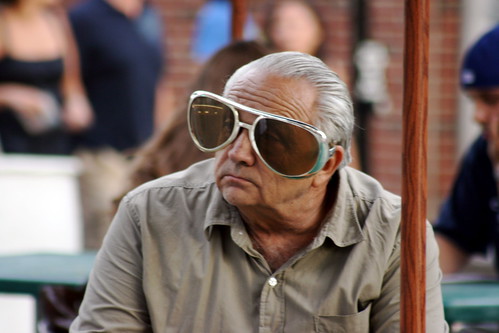Movie City Indie Archive for October, 2008
Gran Torino, a film by Dramis Pereo, produced by Flurshurlinger Mishloff and Skofrol Framuk
 The trailer for Clint Eastwood’s Gran Torino is up; the credit block on the splash page is… unusual?
The trailer for Clint Eastwood’s Gran Torino is up; the credit block on the splash page is… unusual?
Close-ups at work: women on Sarah Palin
Close-ups work.
Lance Hammer on filmmaking today: The adults have left the room
A few optimistic words from the director of Ballast.
What was the most viewed indie of the weekend with 165,00 viewers? Princess of Nebraska
On Monday, I had a conversation with filmmaker Lance Hammer about how movies like his Ballast could make money in the present and emerging market. And while he’s an optimist about the future of filmmaking, he was less than sanguine about the possibility of breaking even with a film like his today. Which is why this news release leaves me with mixed feelings: “165,000 + views in a two-day period is the biggest online opening ever for a feature-length studio film: Wayne Wang’s new film The Princess of Nebraska made its world premiere on YouTube™ on Saturday, October 18, 2008 at 12:00am EST. With more than 165,000 views in its first two days, the online launch represents the most successful studio film premiere in YouTube’s history. In relation to a theatrical release, the film would have placed around 15th on the box office charts. Magnolia Pictures’ Ray Price said, “It’s astounding that over a two day period The Princess of Nebraska became the most widely viewed independent film in the country.” That’s a lot of eyeballs. An interesting small film is getting seen. What’s next? [The film is below.]
RIP Rudy Ray Moore: When I see a ghost, I cut the mutha——.
Wayne Wang's Princess of Nebraska
Wayne Wang’s career as a feature director came with one of the first micro-budgeted success of the once-burgeoning American independent movement (in theatrical terms, at least), 1992’s Chan is Missing Much of his work is with women or bears Chinese and Chinese-American themes, even as he alternates studio work with smaller projects, such as Brooklyn-by-the-block Smoke (1995), written by Paul Auster. With a modest amount of money on hand after shooting, a companion film, Blue in the Face was made in five days by Wang and Auster, and there’s a similar occasion a decade later, with Wang’s latest, the generational drama A Thousand Years of Good Luck in theaters now, and the teensy-scaled The Princess of Nebraska, a story of a young woman making a momentous choice, shot with smaller, mostly consumer-level cameras, including the main character’s cell phones, now showing via YouTube’s Screening Room for free starting today (It’s embedded above.) A primary reason these almost guerilla-scaled collaborations appeal to Wang is how contrary they are to the style of editing in contemporary studio-budgeted projects, where a moment for reflection is a moment to be snipped. It’s called a “pacing pass,” or a review of the assembly to make sure that everything is always moving at the briskest of clips. “Well, that’s true with all these studios now. You preview, you preview, and you’re already chopping things out. And then at the end, they go through a pacing pace and basically anything that is a moment of taking a breath, for the audience to think, they take it right out. So that’s what the studio films have become. There are no characters: they’re heroes, they’re comic strip heroes, and they’re very one-note most of the time. There are a few films that go and deal with characters but there are very few of them. And plot! Everything has to be part of the plot. Everything is so cause-and-effect, it’s unreal. That’s why, again, in my film there are a lot of things that are not explained. A lot of things that don’t lead to something. Which is part of their lives and their conflicts.” Wang is open to evolving forms of distribution, but says, “We need to look at the world in both those ways. The sad thing is probably that the theater films are all going to be event films. That’s the reality.” And smaller pictures? The easy-to-laugh director says, laughing, “It’s fun to do. It’s almost like throwing all the rules out the window.”
Abel Ferrara takes a pirouette around Little Italy
[Via The Circuit.]
Guinness unleashes fridge magnet in Buenos Aires
V. nice sense of place.
Guillaume Depardieu was 37
The U.S. trailer for The Duchess Of Anglaise.














